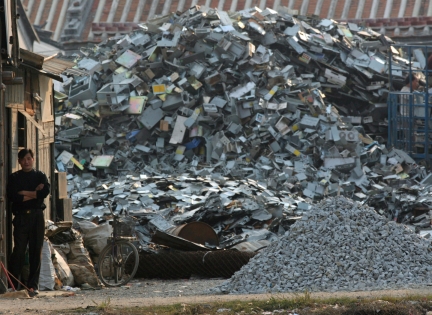Greenpeace chastises 'toxic' IT industry

Environmental campaign group Greenpeace has criticised IT manufacturers for doing too little to make components easy to recycle and re-use.
At the launch of a report entitled Greenpeace Electronics Survey 2007, the organisation also criticised companies for the continued use of toxic chemicals in their products. All of the products surveyed contained brominated flame retardants (BFRs), toxic chemicals which make components impossible to recycle.
"We're finding toxic BFRs in the blood of people working dismantling the products," said Zeina Alhajj, campaign co-ordinator for Greenpeace International. "Mountains of e-waste shipped and dumped in China is being dismantled piece by piece. Currently most products have built-in obsolescence."
Alhajj said many companies manufacturing desktops, notebooks, mobile phones and PDAs — including Lenovo, Panasonic, Samsung and RIM — do not have a high level of recyclability in some products due to the use of BFRs in components, which in turn pushes up manufacturing costs.
"If there were no BFRs in products, companies could reuse copper and gold, and wouldn't have to buy it again," said Alhajj. "This type of manufacturing is heavily reliant on resources which are limited. Prices of resources are going up, so the bill is going up and up."
Alhajj said manufacturers would profit from shifting their business model to using more durable materials, in products that could be upgraded, and sell services to support and upgrade existing technologies.
"Products are not built to be upgraded," said Alhajj. "If only the chip and motherboard need upgrading, why throw away the screen and the keyboard? And why should customers buy a product when they can lease it?"
Alhajj also recommended that companies plan to deploy technologies that are tailored to employee use, and to ask for those products from manufacturers on an upgrade service business model. "Ask yourself why an employee will need a laptop with a webcam if the employee just needs it for word processing," said Alhajj.
Greenpeace also criticised manufacturers for not knowing the energy consumption of products through their entire lifecycle.
"When we surveyed the energy aspect, only one company, Toshiba, was able to provide data about the lifecycle energy consumption for their [laptop] product," said Alhajj.
Lenovo, Panasonic, Samsung and RIM were approached for comment but had not responded in time for this article.
